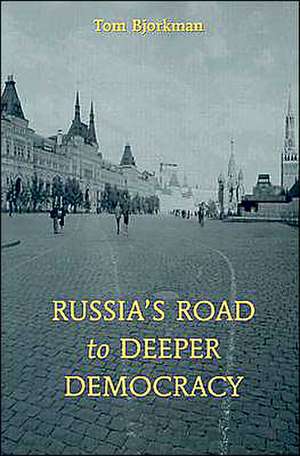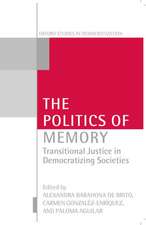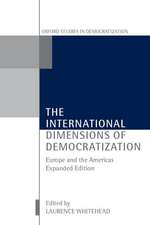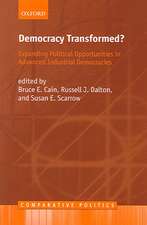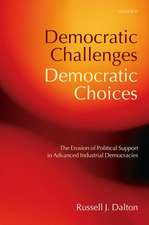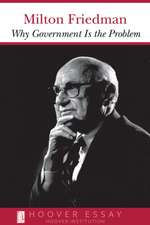Russia's Road To Deeper Democracy
Autor Tom Bjorkmanen Limba Engleză Paperback – 9 mai 2003
Russia has embarked on a slow but steady path of foreign policy alignment with the West. President Vladimir Putin¡¯s market-oriented economic policies and structural reforms have added momentum. But in the long run, the decisive factor in Russia¡¯s relationship with the West will be the nature of the political order it builds on the ruins of communism. There is a broad consensus among Western observers that Russia¡¯s effort to build Western-style democratic institutions in the eleven years since the Soviet collapse has stalled somewhere between democracy as understood in the West and the highly authoritarian order Russia inherited from the USSR. Some would say that Russia is doomed by its history and political culture to a lengthy period of semi-authoritarianism. In Russia¡¯s Road to Deeper Democracy, Tom Bjorkman presents evidence that this assessment is too pessimistic and underestimates the forces for political change that lie beneath the surface of what seems to be an era of political somnolence. Bjorkman argues that it is not the weight of history or the antidemocratic attitudes of the Russian population that restrain Russia from making progress toward stronger democratic institutions but specific leadership policies and elements of Russia¡¯s political elite who have a self-interest in maintaining the status quo. Putin and other senior leaders¡¯ support for proposals for democratic change now under discussion in Russia can create the kind of competitive political marketplace that the country needs to avoid political stagnation and begin to build the strong and prosperous state that all Russians want. America exerts a large influence on Russia¡¯s debate about its political future: by demonstrating that Russia¡¯s progress toward a stronger democratic order matters to the United States and by treating Russia as a part of the West, the United States can buttress internal forces pushing for a deeper Russian democracy.
Preț: 179.13 lei
Nou
Puncte Express: 269
Preț estimativ în valută:
34.28€ • 35.88$ • 28.36£
34.28€ • 35.88$ • 28.36£
Carte tipărită la comandă
Livrare economică 07-21 aprilie
Preluare comenzi: 021 569.72.76
Specificații
ISBN-13: 9780815708995
ISBN-10: 0815708998
Pagini: 141
Dimensiuni: 152 x 229 x 11 mm
Greutate: 0.22 kg
Ediția:New.
Editura: Brookings Institution Press
Colecția Brookings Institution Press
Locul publicării:United States
ISBN-10: 0815708998
Pagini: 141
Dimensiuni: 152 x 229 x 11 mm
Greutate: 0.22 kg
Ediția:New.
Editura: Brookings Institution Press
Colecția Brookings Institution Press
Locul publicării:United States
Notă biografică
Tom Bjorkman is a federal executive fellow in the Foreign Policy Studies program at the Brookings Institution. He is a former deputy chief and managing editor of the President's Daily Brief and former research director for the Office of Russian and Eurasian Analysis at the CIA, and a former special advisor to the ambassador-at-large for the New Independent States at the U.S. Department of State.
Descriere
Russia has embarked on a slow but steady path of foreign policy alignment with the West. President Vladimir Putin¡¯s market-oriented economic policies and structural reforms have added momentum. But in the long run, the decisive factor in Russia¡¯s relationship with the West will be the nature of the political order it builds on the ruins of communism. There is a broad consensus among Western observers that Russia¡¯s effort to build Western-style democratic institutions in the eleven years since the Soviet collapse has stalled somewhere between democracy as understood in the West and the highly authoritarian order Russia inherited from the USSR. Some would say that Russia is doomed by its history and political culture to a lengthy period of semi-authoritarianism. In Russia¡¯s Road to Deeper Democracy, Tom Bjorkman presents evidence that this assessment is too pessimistic and underestimates the forces for political change that lie beneath the surface of what seems to be an era of political somnolence. Bjorkman argues that it is not the weight of history or the antidemocratic attitudes of the Russian population that restrain Russia from making progress toward stronger democratic institutions but specific leadership policies and elements of Russia¡¯s political elite who have a self-interest in maintaining the status quo. Putin and other senior leaders¡¯ support for proposals for democratic change now under discussion in Russia can create the kind of competitive political marketplace that the country needs to avoid political stagnation and begin to build the strong and prosperous state that all Russians want. America exerts a large influence on Russia¡¯s debate about its political future: by demonstrating that Russia¡¯s progress toward a stronger democratic order matters to the United States and by treating Russia as a part of the West, the United States can buttress internal forces pushing for a deeper Russian democracy.
